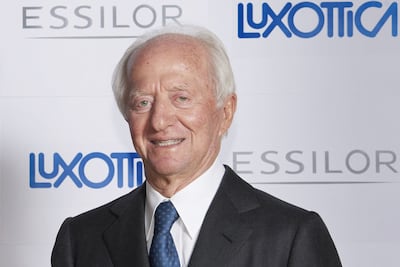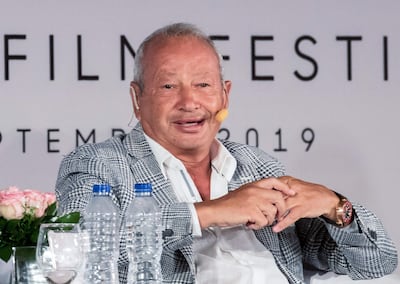Sam Bankman-Fried
The bankruptcy filing by cryptocurrency broker Voyager Digital provides a road map of the company’s relationships, including borrowers, lenders and investors.
It turns out Alameda Research, the trading company cofounded by cryptocurrency billionaire Sam Bankman-Fried, is all three.
As a lender to Voyager, Alameda is owed $75 million under a credit line it offered to the troubled platform last month. But Alameda also owes Voyager $376.8m on a loan, the filing shows.
Alameda is also one of Voyager’s largest shareholders, with a stake of more than 9 per cent, according to data compiled by Bloomberg.
Alameda’s many hats exemplify its extensive influence in cryptocurrencies and helps to explain why Mr Bankman-Fried, who has a net worth of $13.9 billion, is such a key player in the industry.
Mr Bankman-Fried founded Alameda in 2017 to execute cryptocurrency arbitrage trades before moving on to run crypto exchange FTX.
The ties also underscore the interconnected nature of cryptocurrency, a feature that has accelerated losses across the industry during the market’s meltdown this year.
“There is a lot of incestuous activity among crypto-lending firms,” said Aaron Brown, a crypto investor who writes for Bloomberg Opinion.
“In traditional finance, there is more public disclosure and regulatory oversight of these arrangements. There are mechanisms in place [not always effective] to manage conflicts of interest. But crypto is different.”
The different roles played by Alameda point to the extent of “recycled capital” in the cryptocurrency sector, which masks the health of institutions in the space, said Adam Levitin, a law professor at Georgetown University.
“It is likely to lead to overly large exposures and exacerbates interconnectedness among institutions.”
As Voyager ran into potential liquidity problems stemming from Three Arrows, it secured a credit line worth about $485m from Alameda in the middle of June, of which it has drawn $75m, the maximum amount allowed in any 30-day period.
The lifeline was only a partial solution that could not save Voyager, the filing says. Meanwhile as a borrower, Alameda is still on the hook to repay Voyager despite its bankruptcy proceedings.
These kinds of relationships can complicate disputes during time of stress. CoinFlex, a cryptocurrency exchange, recently accused its own investor and client Roger Ver of failing to pay $47m in a margin call. Mr Ver denied the claim and their dispute played out in public on social media.

Leonardo Del Vecchio
Leonardo Del Vecchio’s right-hand man will succeed the Italian billionaire — who died on June 27 — as chairman of the family’s Delfin holding company.
Francesco Milleri, 63, who was appointed on June 28 to follow Del Vecchio as chairman of eyewear company EssilorLuxottica, will now take on the same role at the holding company.
Mr Milleri has been EssilorLuxottica’s chief executive since 2020.
“On the basis of indications left by Del Vecchio, Milleri was named chairman,” Delfin said.
Delfin has assets of about $25bn, including a controlling stake in EssilorLuxottica, a holding in investment bank Mediobanca of slightly below 20 per cent and a stake in insurer Assicurazioni Generali of under 10 per cent.
Del Vecchio, who passed away at 87, leaned on Mr Milleri to help engineer a 2018 deal to combine Luxottica, the company the tycoon founded, with French lens maker Essilor, and then run the combined entity.
Now, Mr Milleri will have a crucial role in the company’s future, charged with carrying out his mentor’s dream of catapulting EssilorLuxottica into the exclusive club of companies valued at more than €100bn ($105bn). The group currently has a market value of about €64bn.
Mr Milleri, who took over as chief executive at EssilorLuxottica after three years of skirmishes between the company’s Italian and French sides, will have his work cut out for him at Delfin as well.
The executive, who shares Del Vecchio’s vision for building Mediobanca and Generali into European leaders, will need to forge a strategy along with the billionaire’s heirs for the holding’s financial investments.
Mr Milleri worked alongside Del Vecchio for the past several years as he tried to bring about changes in strategy at the two companies.
Del Vecchio divided his fortune equally between his wife, six children and the son of one of his former wives, who works at EssilorLuxottica.
The billionaire structured Delfin to avoid the risk that his heirs would break up the company he created and its main investments. A majority of 88 per cent is needed to approve any major change, meaning all eight heirs would have to agree on any major shift in strategy.

Naguib Sawiris
Egyptian billionaire Naguib Sawiris, who has a net worth of $6.37bn, is exploring options for ItaliaOnline, the Italian internet services leader controlled by his holding.
Mr Sawiris’s Orascom is considering the sale of a minority holding or even a controlling stake in the company, sources said.
Any deal could value ItaliaOnline at about €400m. Suitors, including the Netherlands-based Azerion Group, have expressed interest in buying a stake in the company. However, no final decision has been taken and other options could still emerge.
Orascom last month agreed to buy the 27.5 per cent of ItaliaOnline it did not already own through the Libero Acquisition financial vehicle. That deal came about amid a clash over strategy with minority investors, the sources said.
Representatives for ItaliaOnline, Azerion and Orascom declined to comment.
ItaliaOnline last year reported revenue of €292m and earnings before interest, taxes, depreciation and amortisation of about €50m, according to official filings made available to Bloomberg. The company had about 1,200 employees at the end of last year.
ItaliaOnline offers services including local online marketing, digital advertising and online directories, and branded email message services such as Libero Mail and Virgilio.

Nicky Oppenheimer
Billionaire Nicky Oppenheimer, South Africa’s second-richest man, won a court order to temporarily halt mineral exploration on his private family farm in Zimbabwe.
Pearline Mineral Exploration must cease any mining activities on the 65,000-hectare Shangani Ranch, according to a recent High Court of Zimbabwe judgment. The mining magnate sought court protection after workers saw a plane hired by Pearline conducting an aerial geographical survey last month.
The court issued the temporary injunction while it fully considers the matter. Pearline was granted a licence to prospect for minerals in an area that includes parts of the ranch, but the court said it did not have the proper environmental documents to begin exploration.
The Oppenheimer family says it has owned the farm in southern Zimbabwe since 1937, according to the ruling. The farm has a herd of 8,000 cattle, employs 400 people and exports beef to the UK.
The high court found that mining activity had the potential to harm the environment, livestock and wildlife, including a herd of 350 elephants. It ordered Pearline, a South African company, to “permanently cease all mineral prospecting or mineral activities” on the farm.
Mr Oppenheimer sold his family’s 40 per cent stake in De Beers, the world’s largest diamond producer, to Anglo American in 2012 for $5.2bn in cash. He has a net worth of $8.4bn, according to the Bloomberg Billionaires Index.

